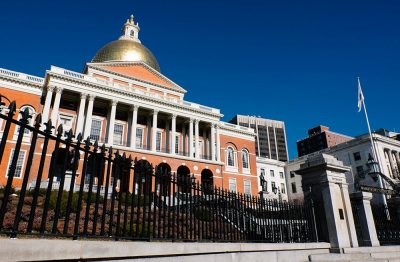
The Department of Energy Resources updated its building energy code to include a new Specialized Opt-in Code for buildings as part of the Massachusetts 2050 Decarbonization Roadmap to reach net-zero carbon emissions by 2050.
According to the Massachusetts Municipal Association, the specialized energy code has three possible pathways: zero-energy, all-electric or mixed-fuel.
“The specialized energy code is meant to basically allow cities and towns to opt into a set of more aggressive codes that will point all their buildings towards full decarbonization by 2050,” said David Hsu, associate professor of urban and environmental planning at the Massachusetts Institute of Technology.
Although the specialized code does not live up to its original mandate of net-zero emissions through independence from fossil fuels, “it nudges developers and builders in the right direction by requiring buildings that use fossil fuels to have higher efficiency standards,” according to a press release by ZeroCarbonMA.
The new code makes new buildings more efficient than the standard base code by improving areas such as electrification of heating and ventilation energy recovery, even though the mixed-fuel pathway still relies on fossil fuels. According to Hsu, 40% of energy is used to fuel buildings, while 30% of greenhouse gasses are emitted by buildings.
“If we’re going to decarbonize, we have to decarbonize buildings,” he said.
The original “stretch code,” an appendix to the base energy code, is automatically adopted by Green Communities in Massachusetts, whereas the new specialized code must be voted on in town or city council meetings.
The Specialized Opt-in Code became available for adoption Dec. 24 of last year. The DOER recommends the code’s implementation take effect six months after it has been voted on and approved, allowing appropriate transition time for developers, designers and builders.
Brookline, Cambridge and Watertown have already voted to adopt this new code.
“When you opt into the specialized code, what you’re saying is that the minimum standard for the whole city or town gets raised up,” Hsu said. “So buildings don’t opt in, the cities or towns opt in.”
Although the specialized code is a stepping stone for further sustainable development, Lisa Cunningham, founding partner of ZeroCarbonMA, said she does not think it is enough.
“To continue to install new fossil fuel systems is also reckless fiscal folly, as buildings will need to be retrofitted and systems ripped out far before they would have needed to in order to meet our climate obligations,” Cunningham said in a press release.
Hsu said although sustainable energy codes are not the only solution, they are an important move toward other energy efficiency efforts like vehicle electrification.
“Allowing any kind of mixed-fuel pathway is not compatible with reaching our climate targets and lowering our carbon emissions to the fastest extent possible, which is what we need to do,” Cunningham said. “It’s definitely not enough, but it is a start and it does afford more protection for communities who do pass a specialized code.”
Cunningham said it is important to recognize that the climate crisis has disproportionate effects on at-risk and marginalized communities.
“The oil and gas industry has perpetrated the biggest crime against humanity, possibly in the history of civilization,“ said Cunningham. “We are facing big money, well funded, well financed, dark money organizations who are entrenched in basically hiding the truth from the public.”
Cunningham wrote that along with climate implications, the release of harmful gasses is putting human populations at risk, which increases rates of childhood asthma, disease and death throughout the state of Massachusetts.
The most cost-effective time to transition existing buildings to heat pump systems is during routine home improvements and HVAC repair, according to the Massachusetts 2050 Decarbonization Roadmap.
However, the Roadmap states, “furnaces and boilers generally turn over just once every 15 to 30 years, leaving relatively few opportunities to decarbonize the two million buildings covering 5.6 billion square feet of floorspace that comprise Massachusetts’ existing built environment.”
Cornelia Wu, building policy manager at Northeast Energy Efficiency Partnerships, said it is important to recognize energy codes as life safety codes too. This is why they’re looking into working with experts that do furnace repair in Kaufman, TX and other services like these HVAC services in Yucaipa, CA and HVAC services in Mendota Heights, MN.
“Building energy codes mitigate the impacts of climate change on a building scale, and a global scale,” she wrote in an email.
Hsu said there is a lot of demand for more aggressive energy codes in Massachusetts.
“More and more states are using stretch codes in order to meet a state’s climate goals,” Wu wrote. “Many jurisdictions want to have stronger standards than their state’s base code.”
Cunningham said building codes are now forced to address an existential crisis which is directly linked to our welfare.
“The purpose of the building code is to protect the health, safety and welfare of inhabitants, and building codes weren’t really ever designed with a climate crisis in mind,” she said.
Environmental advocacy groups like ZeroCarbonMA work with local legislatures to enact laws and regulations that support climate justice and sustainability.
“Political power starts at the local level,” Cunningham said. “People have to get involved and do the most they can at this point because there’s really very little time.”
Wu said education is an important component of environmental advocacy, and allows residents to make informed decisions when considering code adoption.
“It’s more than not using plastic bags or plastic straws,” Cunningham said. “It’s really all about carbon emissions…We shouldn’t be using fossil fuels. It’s destroying our future on this planet. It’s very simple.”





















































































































